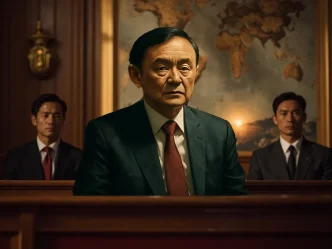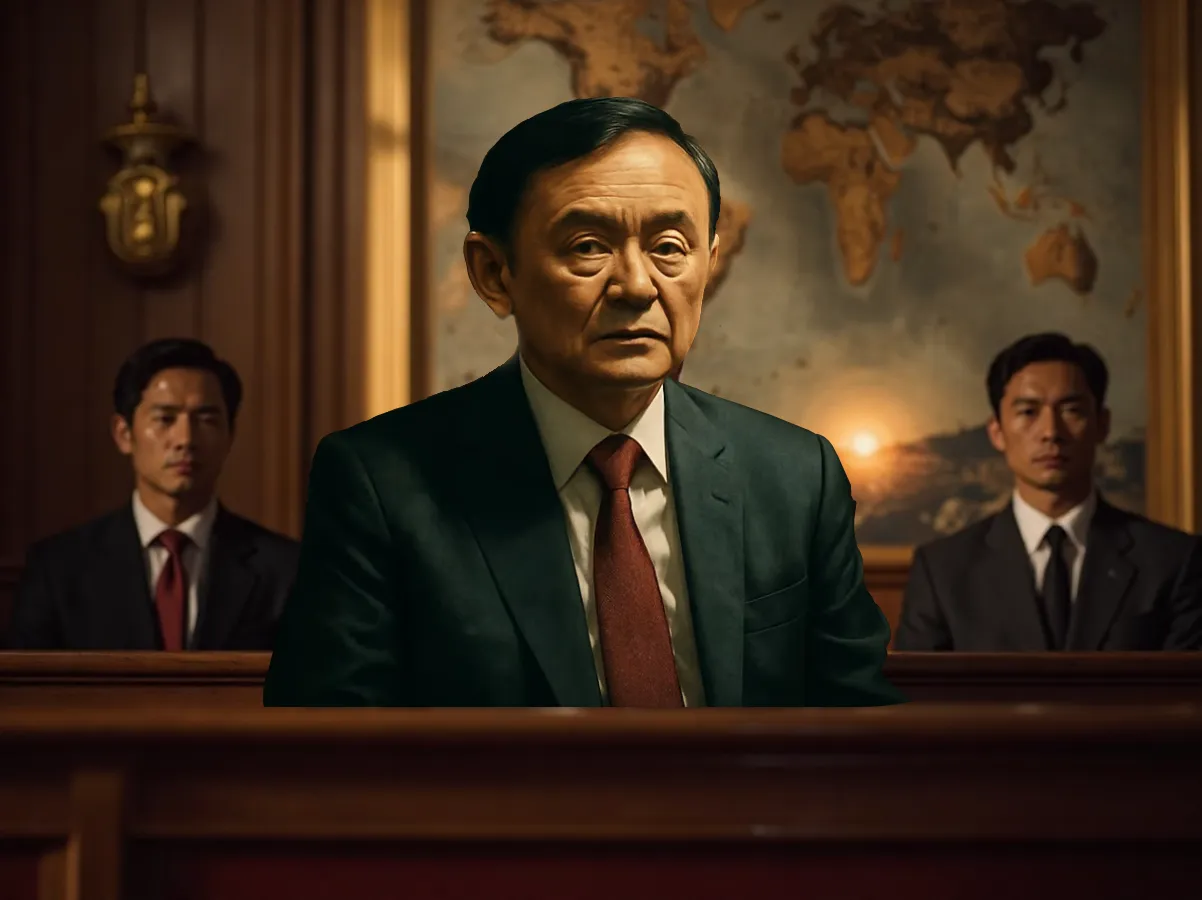Former Thai Prime Minister Thaksin Shinawatra has publicly dismissed swirling rumours of fleeing the country ahead of a critical Supreme Court hearing scheduled for June 13, 2025. Speaking to journalists at the Office of the Narcotics Control Board (ONCB) in Bangkok on May 27, Thaksin addressed multiple controversies, including his medical stay during imprisonment, ethical concerns with the Medical Council, and ongoing legal challenges faced by his sister, former Prime Minister Yingluck Shinawatra. His remarks come at a time of heightened political tension in Thailand, with speculation about his influence over the current government and potential shifts within the ruling coalition.
Denying Rumours of Flight
Thaksin, who returned to Thailand in August 2023 after years in self-imposed exile, faces scrutiny over his medical stay on the 14th floor of the Police General Hospital during his prison sentence. The Supreme Court’s Criminal Division for Political Office Holders is set to hold a hearing on June 13 to examine the circumstances of this arrangement. Rumours have circulated that Thaksin might leave the country before the hearing, a claim he categorically rejected during his interview.
“I don’t pay much attention to the rumours because a rumour is news that people want to be true, which mostly isn’t true” said Thaksin. He urged the public and media to avoid fixating on unverified speculation, emphasizing his intent to cooperate with the judicial process. When pressed on whether he would attend the upcoming hearing, Thaksin noted he was consulting with his legal team and would make a decision by midnight on June 12. “If the court needs information, I’ll provide it” he added, downplaying the drama surrounding the event with a lighthearted jab at journalists: “There’s nothing to be excited about — journalists shouldn’t be more excited than I.”
Thaksin also refuted suggestions that his decision to remain in Thailand was tied to his daughter, Paetongtarn Shinawatra, currently serving as Prime Minister. Instead, he framed his return as a duty following a Royal Pardon that reduced his sentence, expressing a commitment to use his experience for the benefit of the Thai people. This narrative underscores his attempt to reposition himself as a statesman rather than a fugitive, though sceptics remain unconvinced given his long history of legal and political battles.
Criticism of the Medical Council
Another focal point of Thaksin’s interview was the Medical Council’s decision to discipline three doctors involved in his hospital stay. Thaksin sharply criticized the council, alleging ethical lapses in its handling of his case. He pointed to leaked messages from a group chat where council members reportedly insulted him before reviewing the evidence, calling it “an ethical problem in itself.”
“The Medical Council is supposed to oversee doctors’ ethics, but sometimes the council itself lacks ethics” Thaksin stated. Despite the ruling, he appeared unfazed, describing himself as relaxed and unconcerned about the outcome. Recounting a personal anecdote, he mentioned how the Prime Minister had brought him roast duck before the interview, adding, “I feel relaxed, finish my meals comfortably, and don’t overthink. At my age, why would I?”
Thaksin also cautioned against premature conclusions regarding the broader implications of the council’s decision or the upcoming court hearing. He stressed that even judges must thoroughly evaluate evidence and testimonies before reaching a verdict, a reminder of the complexity and sensitivity of his legal situation.
Yingluck’s Legal Battle and the Rice Pledging Scheme
Thaksin also addressed the ongoing legal challenges faced by his sister, Yingluck Shinawatra, concerning the controversial rice pledging scheme from her tenure as Prime Minister. The Supreme Administrative Court recently clarified that Yingluck is the plaintiff, not the defendant, in a case against the Ministry of Finance. She has challenged the Administrative Court’s earlier decision to impose a fine of 35 billion Thai Baht (US$980 million), arguing that the penalty was unjust.
According to Thaksin, the court’s review found some aspects of the case valid and others not, with the fine now capped at 10 billion Thai Baht (US$280 million). The exact amount remains under negotiation, hinging on whether the Ministry of Finance has been adequately compensated and if actual damages can be proven. Yingluck retains the right to request reconsideration within 90 days, a window that could shape her next steps.
When asked if this legal issue might hinder Yingluck’s potential return to Thailand, Thaksin advised patience, suggesting that current tensions would eventually subside. “We should wait until everything calms down. Right now, there are people stirring up trouble — I don’t know who they are, but the storm will pass. It will be over soon. There’s nothing to worry about” he said. His comments reflect a cautious optimism, though the political climate remains volatile with Yingluck still in exile.
Political Alliances and Coalition Stability
Thaksin’s interview also touched on recent political developments, including an unexpected alliance between former leaders of the United Front for Democracy Against Dictatorship (UDD) and the People’s Alliance for Democracy (PAD), two historically opposing factions. Jatuporn Prompan and Sondhi Limthongkul have reportedly joined forces to oppose what they describe as the “Thaksin regime.” Thaksin dismissed the alliance as inconsequential, advising observers to “not pay attention to it.”
Speculation about internal rifts within the ruling coalition also surfaced, particularly regarding a potential “proxy war” between Thaksin’s Pheu Thai Party and the Bhumjaithai Party (BJT), led by Newin Chidchob. Thaksin downplayed such rumours, noting that he meets regularly with Newin — their last encounter being two months prior — and insisted on mutual respect among coalition partners. “Everything follows rules, and we must maintain respect within the coalition government. The coalition partners have stayed together until now and will continue to do so until the end. There’s no need to worry — there will be no change of prime minister mid-term” he said.
However, Thaksin left open the possibility of a parliamentary dissolution and a new election, framing it as a democratic mechanism for the Thai people to decide their future. He was quick to clarify that such a scenario remains distant, tempering expectations of immediate political upheaval.
Thaksin’s Enduring Influence
Thaksin Shinawatra’s latest public appearance and statements underscore his enduring, if controversial, influence over Thai politics. Having returned to the country under a cloud of legal challenges, his reduced sentence via Royal Pardon and his daughter’s ascension to the premiership have fueled debates about his behind-the-scenes role in governance. Critics argue that his presence risks destabilizing an already fragile political landscape, pointing to lingering resentment from past conflicts during his tenure and subsequent ousting in a 2006 military coup.
Supporters, however, view Thaksin as a populist leader whose policies uplifted rural communities and challenged entrenched elites. His dismissal of rumours and legal concerns may be an attempt to project stability and resilience, both for himself and the broader Shinawatra political dynasty. Yet, the upcoming Supreme Court hearing on June 13 looms large, with potential ramifications for his personal freedom and the credibility of Thailand’s judicial processes.
Broader Implications for Thailand
Thaksin’s legal battles are not isolated incidents but part of a broader struggle over power and accountability in Thailand. The rice pledging scheme, for instance, remains a lightning rod for criticism of the Shinawatra family’s economic policies, with opponents alleging widespread corruption and mismanagement. The capped fine for Yingluck, while a reduction, still represents a significant financial and symbolic burden, and her eventual return could reignite old divisions.
Moreover, the unusual alliance between former UDD and PAD leaders signals a potential realignment of political forces against Thaksin’s influence. While he publicly brushes off such developments, the convergence of historically antagonistic groups suggests a shared frustration with the status quo, which could complicate the coalition government’s ability to maintain unity.
Ethical questions surrounding the Medical Council’s conduct also highlight broader systemic issues within Thailand’s institutions. Thaksin’s accusation of bias — backed by leaked messages — raises concerns about impartiality in bodies meant to uphold professional standards. If substantiated, such claims could erode public trust in regulatory frameworks, a challenge that extends beyond his individual case.
Looking Ahead
As Thailand navigates these overlapping controversies, the coming weeks will be critical. Thaksin’s decision on whether to attend the June 13 hearing could set the tone for how his legal saga unfolds, while Yingluck’s next moves regarding the rice scheme fine will test the boundaries of judicial and political reconciliation. Meanwhile, the coalition government faces the delicate task of balancing internal dynamics with public expectations, all under the shadow of Thaksin’s polarizing legacy.
For now, Thaksin appears determined to weather the storm, projecting calm amid uncertainty. Whether this stance will hold as legal and political pressures mount remains an open question, one that Thailand’s citizens and observers alike will be watching closely.
















